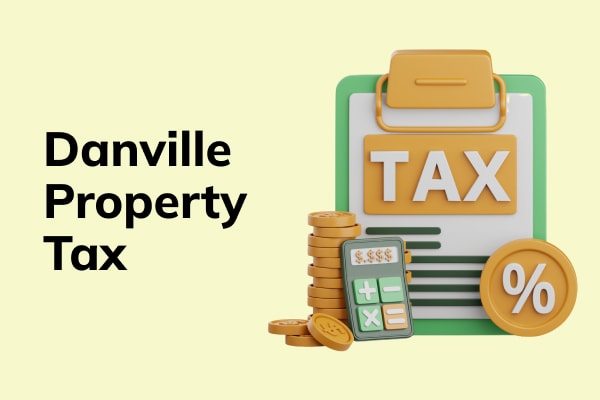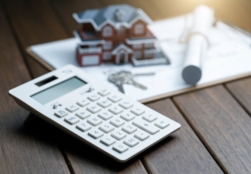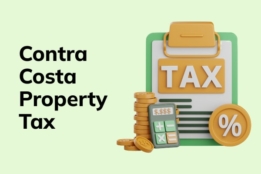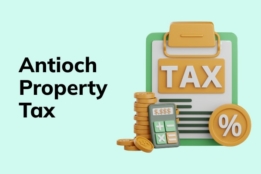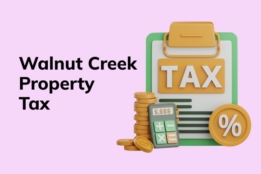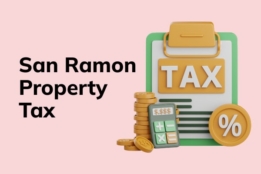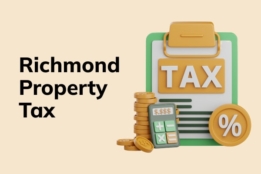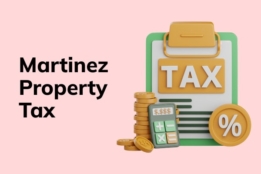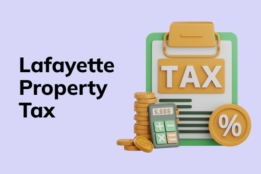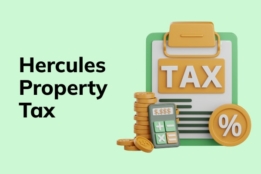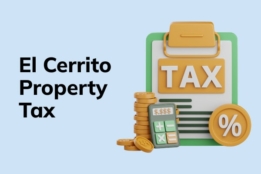Table of content
How Much Are Property Taxes In Danville?
At the time of writing, the property tax in Danville is calculated at 1.11%. Contra Costa County property tax rates have to take the California base rate of 1% into account. Property tax rates cannot be higher than that, though some areas have special assessments in place that push the property tax over that threshold. The amount of property tax you pay depends on:
- The local property tax rate (including local direct/special assessments in the area)
- The property’s assessed market value
Property tax rates are calculated to be fair for the people in an area. If you want to try and lower your liability, we have a section on that later in the article.
Property tax rates in Danville are very close to the average for California and typical for Contra Costa. One likely explanation for this is the fact that average house prices in Danville are very high – it is an affluent city. When property values are high, high levels of tax can still be collected even with a lower tax rate. This is not a given, but you will often find that property tax rates are lower in areas where there is high-value real estate.
Danville property tax rates have been consistent in recent years as real estate has been soaring in value. The demand for housing in the city is outstripping the stock of real estate, driving house prices higher. It is a beautiful city with lots of opportunity and a great quality of life, but the cost of living is also quite high.
How To Calculate Property Taxes In Danville?
Calculating property taxes in Danville is a fairly simple process once you know the key pieces of information. These are:
- The property’s fair market value for tax purposes
- The rate of property tax for the address
With these figures to hand, you have all you need to make the calculation. Start by working out 1% of the value of your home – this is done by dividing the fair market value by 100. Once you have this, you can multiply that number by the actual tax rate to calculate the amount you would owe for the year. Always bear in mind that property tax rates change over time, so this is only an indication of what you would pay at first.
As you can see from this, the property’s assessed market value is pivotal. Regular property appraisals are important for keeping this up-to-date, and must usually be undertaken if you have improvements done. This ensures the assessed market value of the property remains as accurate as possible at all times. Note that annual property value increases for tax purposes cannot exceed 2%, no matter how much the market value actually increases. But if you have improvements done, the property tax rate can increase in line with the value that improvement adds. A change in ownership can also push the value higher.
When appraising properties, the assessors generally takes the following into account:
- The property type
- Improvements and additions
- The selling prices of similar properties in the neighborhood
Features like swimming pools and multi-storey additions can add significant value to a property. The assessor will consider this when valuing the property and new improvements are likely to make a big difference. Their expertise will determine the fair market value, but you may have the option to challenge their decision – more on this later.
Let’s explore an example of calculating property tax. Let’s say your home is a 4-bedroom house with a 2-storey addition. The assessor calculates the fair market value at $1,050,000 and the property tax rate for the address is 1.11%. With these figures in mind, the property tax calculation goes like this:
- Divide the value of the home by 100 (1,050,000 ÷ 100 = 10,500)
- Take the answer and multiply it by the property tax rate (10,500 x 0.80 = 11,655)
- For this example, you would owe $11,655 in property tax per year
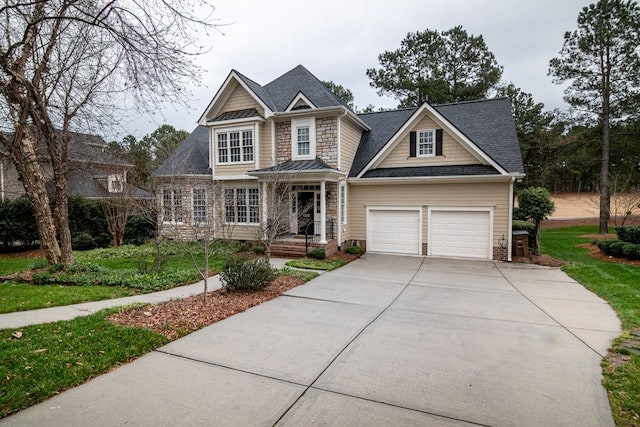
How To Pay Your Danville Property Taxes?
Property owners in Danville are legally responsible for paying their property tax bills on time. Bills are mailed out at the same time each year, but if yours doesn’t arrive then it is down to you to follow up and make sure you still pay on time.
The Contra Costa Treasurer-Tax Collector issues property tax bills and collects payments in Danville. You have several methods available to make the payment:
- Credit/debit card – This is a popular payment method that you can use for in-person, online and over-the-phone payments. It is very convenient but you should be aware that there will be a service fee.
- Check/e-check – You can send a physical check through the mail using the return envelope that comes with your bill. E-checks can be used to make payments online or over the phone.
- Cash – If you travel to Martinez to pay what you owe in person, cash is one of the options available to you.
- There are usually other payment methods available – information will be included with your tax bill. You will also be able to find that information online.
The best payment option depends on your circumstances. The service fee for using a credit or debit card is currently 2.5%, with a minimum charge of $3.50. Be advised that you will incur a returned check fee of $85 if your check or e-check is rejected for any reason.
If you choose to pay in person, you must visit the Finance Building in Martinez, CA. Walk-ins are accepted Monday through Friday from 8am to 5pm. Your other options are as follows:
- Pay online – Do this via the online portal
- Pay by phone – Do this by calling 25-608-9500 and follow the prompts of the interactive voice response system
- Pay by mail – There will be a return envelope in the pack that contains your property tax bill. Follow the instructions on the bill.
Danville Property Tax Due Dates
Danville property tax bills are issued in September-October. This is when they are mailed out, so you should receive yours in October. If you reach November 10 and yours still hasn’t arrived, you should contact the Tax Collector’s Office to ask about it. The online version of the bills becomes available in October and you can access this with your Assessor’s Parcel Number and other details of your property.
With regards to payment, your property tax bill is charged in 2 installments:
- The due date for installment 1 is November 1. You have until December 10 to make the payment.
- Installment 2 becomes due on February 1. The deadline for payment is April 10.
- If you want to pay both installments together, you can do so before the first deadline (December 10).
Timely payment of your bills enables you to avoid being charged a penalty. If you know that paying on time will be a problem for you, it may be possible to apply for a property tax postponement. Doing this will defer your payment dates, but you will still have to pay the amount in full. There is a limited budget for postponements so you must contact the Tax Office early to be in with a chance.
What Happens If Your Payment Is Late?
If you fail to pay either, or both, of your property tax bill installments by the deadlines, you will be charged penalty fees.
- The penalty for missing the first deadline is a 10% addition to the amount owed.
- The penalty for the second installment is also a 10% addition, plus a $20 administrative fee.
These are the initial penalties for non-payment. You should aim to pay what you owe as soon as possible, because after June 30 you will become tax-defaulted. This lands you with more charges in the form of interest charged at 1.5% on your debt at the start of each month. This will continue for up to 5 years. If you still have not paid what you owe, tax authorities are granted additional powers to seize your property and sell it at auction to pay off your debt.
If late payment becomes an issue for you, you should aim to pay your debt as soon as possible. A redemption installment plan is an option if you need to pay it off in increments. Just remember that, as more time passes, your debt will increase.
How To Lower Your Tax Liability?
Lowering one’s property tax liability is a common practice for people in Danville. The avenues for doing so look like this:
- You could apply for a special tax exemption/exclusion, if you qualify
- You could challenge the fair market value from your property appraisal
- Homeowners exemption (more on this below)
The Assessor’s Office issues application forms for exemptions and evaluates them once submitted. These exemptions exist to reduce the tax burden for certain groups or individuals. You could apply for:
- Seniors exemption
- A Church/non-profit exemption
- Veteran’s exemption, aimed at supporting ex-military personnel
- Proposition 19
There are very specific criteria to qualify for each of these exemptions. Only apply if you are confident that you meet those criteria. Application forms can be obtained from the Contra Costa County Assessor’s Office. Decisions are made at the discretion of the assessor.
Challenging your assessed property value is the other avenue for reducing your tax liability. The first step is to contact your assessor and request a Proposition 8 Review. This consists of reevaluating the existing value for property tax against current market value. If this doesn’t resolve your issue, you can appeal against the assessment between July 2nd and November 30th.

What Is Homeowners Property Tax Exemption?
You may qualify for Danville homeowners property tax exemption if you own your home and it is your main residence. This could help lower your property tax liability by taking an amount off the assessed value of your home – up to $7,000 (or $70 off your tax bill). This will reduce your liability since property tax is calculated as a percentage of overall property value.
This exemption is aimed at owner-occupiers in Danville. Thus, landlords are not able to apply for it. The application form is typically sent out automatically when a person purchases a property. You can also request it at a later date.
Frequently Asked Questions
How Much Are Property Taxes In Danville?
At the time of writing, the average Danville property tax rate is 1.11%. This is subject to change over time.
How To Pay Your Danville Property Taxes
You can pay your property tax bill by credit/debit card, check or cash. There may be some other payment options available as well. Make the payment in person, online, over the phone or in the mail.
What Happens If Your Payment Is Late?
Late payments incur a penalty charge of 10% added to the amount owed. If the debt remains outstanding for a long time, other charges will apply.
